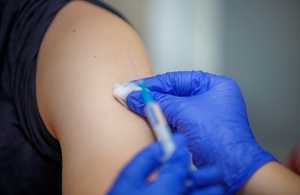Clinical trialists to be offered 'top-up' vaccine doses
Vaccine clinical trial participants to be offered additional approved vaccines for international travel from next week.

- Trialists will also be offered booster jabs, if eligible
- Move follows consultation with the independent Joint Committee on Vaccination and Immunisation (JCVI) and medical experts
Vaccine clinical trial participants are to be offered the option to get additional vaccine doses from next week, to ensure they can travel abroad to countries which currently only accept vaccination records with approved for deployment COVID-19 vaccinations.
The UK recognises those who are in COVID-19 vaccine clinical trials as fully vaccinated for the purpose of certification, both domestic and international. The majority of other countries currently do not recognise clinical trial volunteers and require visitors to have been fully vaccinated with a vaccine that has been approved for deployment by the relevant medicines regulator.
The government has therefore taken the decision that those who are in COVID-19 vaccine clinical trials who have not had a vaccine that is approved for deployment will be given the opportunity to receive 2 additional doses of an approved vaccine. This will allow them to have the necessary certification status to travel abroad to countries which do not currently recognise trial vaccinations.
The additional doses will initially be offered to those taking part in the Novavax trial, which includes the vast majority of those in ongoing trials for vaccines not yet approved for deployment. The offer will then be rolled out to participants in other relevant trials within the coming weeks. Novavax participants will be offered 2 doses of the Pfizer/BioNTech vaccine, with an 8-week interval between first and second doses.
In addition, people who have received both doses of a vaccine as part of a clinical trial will also be offered a booster jab, if eligible in line with the wider boosters advice from the JCVI. This is to ensure the protection they’ve received from vaccination as part of the trial is prolonged over the winter months.
This new approach, which will apply to England, has been developed with the independent experts on the JCVI and the chief investigators for the clinical trials.
Deputy Chief Medical Officer Professor Jonathan Van-Tam said:
COVID-19 vaccine trials have been absolutely integral to our response to the virus, and as a result we now have our renowned vaccination programme, which continues to save lives. I urge as many people as possible to continue contributing to these trials.
The measures we have taken will allow UK COVID-19 vaccine trial participants to travel freely overseas once they have had the additional vaccinations. Those volunteers now have the flexibility to make a decision for themselves so they can, for example, visit loved ones abroad.
We should be very clear that the results from these trials benefit the whole world, and it has to be said that if more countries around the world had reciprocated by allowing UK volunteers to enjoy fully vaccinated status for overseas travel, these measures would not have been necessary.
As a separate issue, those in trials who are eligible for boosters should receive the booster dose in order to ensure the highest possible protection over winter.
The move follows the Health and Social Care Secretary’s appeal to global health leaders last month at the G20 meeting for clinical trial pioneers to have their vaccination status recognised globally.
NHSX and NHS Digital are working at pace to reflect these doses in the COVID Pass for international travel as soon as possible and further details will be set out in due course.
Given the value clinical trial participation adds to global public health and science, the UK already recognises trial participants as fully vaccinated and continues to urge other countries to do the same.
The government is working closely with international counterparts to ensure a longer-term solution can be reached for these individuals, and is in active conversations with other countries through groups such as the G7, the EU Commission and the World Health Organization (WHO).
Letters will be sent out to clinical trial participants shortly, outlining further details and next steps. Participants will be contacted by the trial team, who can respond to any questions they may have, and should not contact their local NHS or GP. Vaccinations will most likely take place at hospital hubs.
Booster jabs for those eligible will be offered no earlier than 6 months after the individual’s second dose.
Principle Investigator of the Novavax clinical trial, Professor Paul Heath, said:
I very much welcome this development on behalf of the more than 15,000 participants in the Novavax trial and my colleagues in the 35 UK trial sites.
For too long the participants have been disadvantaged in terms of international travel because this vaccine is not yet approved for deployment – but trial participants now have the flexibility to receive booster doses, or additional doses for travel purposes, if they wish to.
All clinical trial participants can already gain access to an NHS COVID Pass for domestic purposes. They should have received a letter confirming their participation in the specific vaccine study and confirming that they have the same protected status as someone who has received the approved vaccines. Participants should contact their clinical trial site if this is not the case.
There are around 52,000 people currently taking part in trials across the UK, with 21,000 given a vaccine not yet approved for deployment by the Medicines and Healthcare products Regulatory Agency (MHRA). Around 15,000 of these are taking part in the Novavax clinical trial.
The Vaccine Taskforce and the MHRA are working with the vaccine companies to help ensure their COVID-19 vaccines are authorised as quickly as possible, if they meet the high standards of safety, quality and effectiveness.
The decision to license a vaccine is made by the MHRA, who must carefully, independently and scientifically review the data to ascertain how it protects people from COVID-19 and the level of protection it provides.